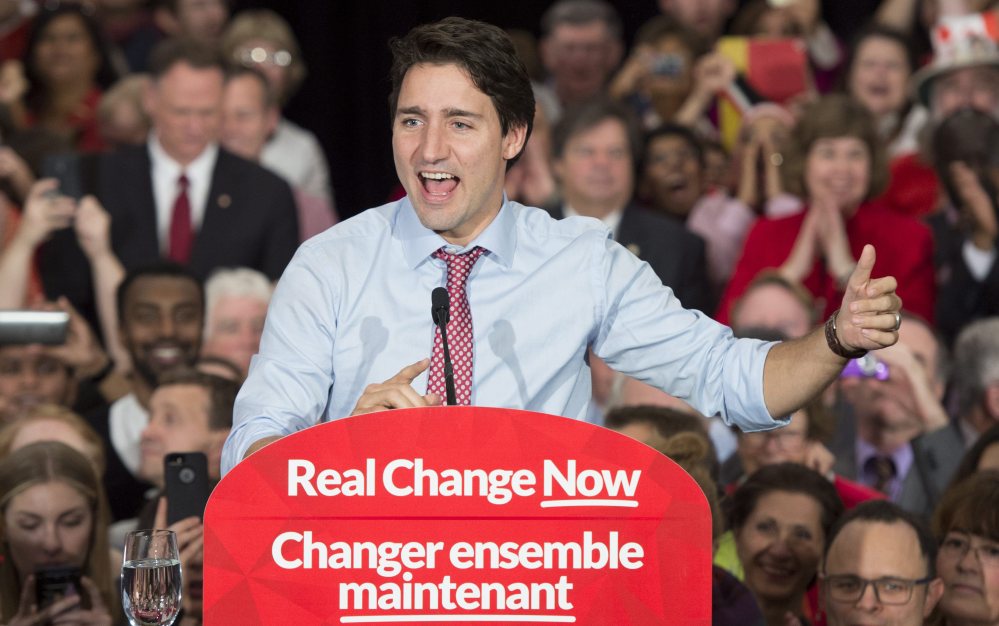TORONTO — The stunning victory of Justin Trudeau will have reverberations beyond Canada’s borders after the Liberal Party leader emphatically put an end to a decade of rule by the most conservative leadership in the country’s history.
Among the areas in which Trudeau differs from his predecessor, Conservative Stephen Harper: airstrikes against the Islamic State group, support for Israel, climate change, immigration and how much relations with the U.S. should hinge on the future of the Keystone XL oil pipeline.
Speaking in Ottawa on Tuesday, the 43-year-old Trudeau – son of one of the country’s most dynamic politicians – underlined the sea change.
“I want to say this to this country’s friends around the world: Many of you have worried that Canada has lost its compassionate and constructive voice in the world over the past 10 years. Well, I have a simple message for you on behalf of 35 million Canadians. We’re back,” he declared.
With Trudeau’s decisive victory on Monday, Canadian voters reclaimed their country’s liberal identity, giving the new prime minister a commanding majority in parliament that will allow him to govern without relying on other parties.
That means change in Canadian policies on a broad spectrum of issues.
“Canada will go back to multilateralism, back to strong support for the United Nations,” said Robert Bothwell, a professor at the University of Toronto.
The son of the late Prime Minister Pierre Trudeau, who swept to office in 1968 on a wave of support dubbed “Trudeaumania” and governed for most of the next two decades, the younger Trudeau channels the star power – if not quite the political heft – of his father.
Tall and trim, he is a former school teacher and member of Parliament since 2008. He becomes the second-youngest prime minister in Canadian history and has been likened to U.S. President Barack Obama.
“The whole tone of the U.S.-Canada relationship will change. Philosophically Obama and Trudeau are much closer,” Bothwell said.
The White House said Obama called to congratulate Trudeau Tuesday and said in a statement the two leaders “committed to strengthening the countries’ joint efforts to promote trade, combat terrorism and mitigate climate change.”
Obama “also teased me about my lack of grey hair, but said I’d probably get some quite soon,” the dark-haired Trudeau quipped at a news conference later.
Trudeau’s victory will likely improve ties with the United States, at least for the remainder of Obama’s presidency. Harper was frustrated by Obama’s reluctance to approve the Keystone XL pipeline from Alberta to Texas and clashed with the president on other issues, including the Iran nuclear deal.
Although Trudeau supports the Keystone pipeline, he argues relations should not hinge on the project.
“Theoretically, Justin is for Keystone, but he can obviously jettison that,” Bothwell said of the project, which Democratic presidential hopeful Hillary Clinton recently expressed opposition to.
Still, there are other differences that could lead to friction with the U.S. Trudeau has said he’ll remove Canada’s six fighter jets from the U.S.-led bombing campaign against the Islamic State group. Harper had said removing the jets from the fight would hurt relations with the U.S.
Trudeau has also vowed to take in 25,000 Syrian refugees by the end of the year. Harper declined to resettle more Syrian refugees. Some analysts have questioned whether Trudeau’s goal is realistic.
Canada shifted to the center-right under Harper, who lowered sales and corporate taxes, avoided climate change legislation, strongly supported the oil and gas extraction industry and backed the right-wing government of Israeli Prime Minister Benjamin Netanyahu.
Trudeau will have a more balanced approach to the conflict in the Middle East, analysts said.
Trudeau has also vowed to consult the premiers of Canada’s provinces in an effort to come up with a plan ahead of the Paris climate talks in November. Under Harper, Canada pulled out of the Kyoto Protocol, the emissions reduction program for rich countries, and the Conservative leader was perceived by environmentalists as more interested in protecting Canada’s oil-rich region of Alberta – which has the third-largest oil reserves in the world – than efforts to stem the effects of climate change.
“Canada’s days of being a less-than-enthusiastic actor on the climate-change file are behind us,” Trudeau told the news conference in Ottawa.
Trudeau, who has promised to raise taxes on the rich and run deficits for three years to boost government spending, said positive politics led to his victory.
Send questions/comments to the editors.



Success. Please wait for the page to reload. If the page does not reload within 5 seconds, please refresh the page.
Enter your email and password to access comments.
Hi, to comment on stories you must . This profile is in addition to your subscription and website login.
Already have a commenting profile? .
Invalid username/password.
Please check your email to confirm and complete your registration.
Only subscribers are eligible to post comments. Please subscribe or login first for digital access. Here’s why.
Use the form below to reset your password. When you've submitted your account email, we will send an email with a reset code.